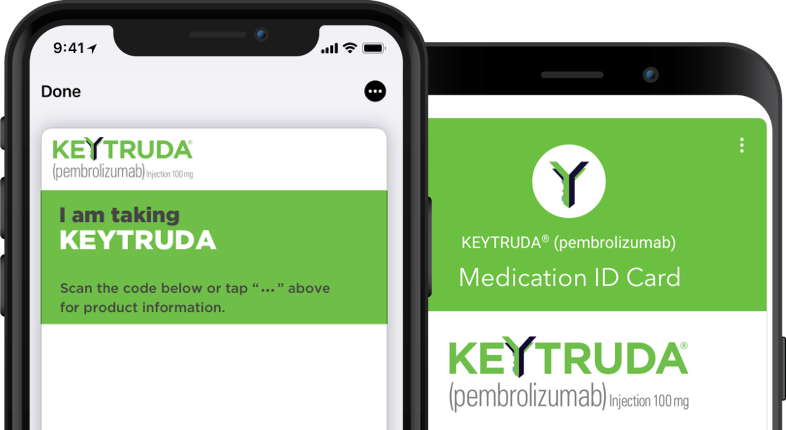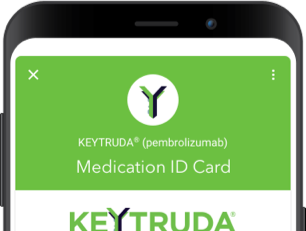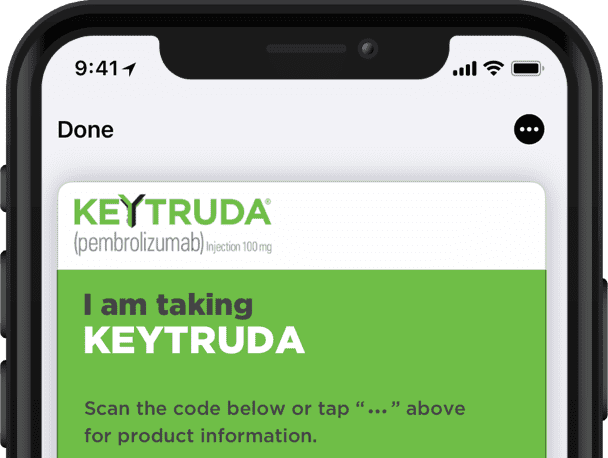On this page:
Side effects may occur while taking KEYTRUDA
During treatment with KEYTRUDA, side effects can occur and should be treated as early as possible. In clinical trials with KEYTRUDA, some patients stopped treatment due to side effects. Tell your doctor if you have any side effect that bothers you or that does not go away.
Serious side effects
KEYTRUDA is a medicine that may treat certain cancers by working with your immune system. KEYTRUDA can cause your immune system to attack normal organs and tissues in any area of your body and can affect the way they work. These problems can sometimes become severe or life-threatening and can lead to death. You can have more than one of these problems at the same time. These problems may happen anytime during treatment or even after your treatment has ended.
Related topics
Call or see your health care provider right away if you develop any signs or symptoms of the following problems or if they get worse. These are not all of the signs and symptoms of immune system problems that can happen with KEYTRUDA:
Lung problems:
- Cough
- Shortness of breath
- Chest pain
Intestinal problems:
- Diarrhea (loose stools) or more frequent bowel movements than usual
- Stools that are black, tarry, sticky, or have blood or mucus
- Severe stomach-area (abdomen) pain or tenderness
Liver problems:
- Yellowing of your skin or the whites of your eyes
- Severe nausea or vomiting
- Pain on the right side of your stomach area (abdomen)
- Dark urine (tea colored)
- Bleeding or bruising more easily than normal
Kidney problems:
- Decrease in your amount of urine
- Blood in your urine
- Swelling of your ankles
- Loss of appetite
Skin problems:
- Rash
- Itching
- Skin blistering or peeling
- Painful sores or ulcers in your mouth or in your nose, throat, or genital area
- Fever or flu-like symptoms
- Swollen lymph nodes
Hormone gland problems:
- Headaches that will not go away or unusual headaches
- Eye sensitivity to light
- Eye problems
- Rapid heartbeat
- Increased sweating
- Extreme tiredness
- Weight gain or weight loss
- Feeling more hungry or thirsty than usual
- Urinating more often than usual
- Hair loss
- Feeling cold
- Constipation
- Your voice gets deeper
- Dizziness or fainting
- Changes in mood or behavior, such as decreased sex drive, irritability, or forgetfulness
Problems can also happen in other organs and tissues. These are not all of the signs and symptoms of immune system problems that can happen with KEYTRUDA. Call or see your health care provider right away for any new or worsening signs or symptoms, which may include:
- Chest pain, irregular heartbeat, shortness of breath, swelling of ankles
- Confusion, sleepiness, memory problems, changes in mood or behavior, stiff neck, balance problems, tingling or numbness of the arms or legs
- Double vision, blurry vision, sensitivity to light, eye pain, changes in eyesight
- Persistent or severe muscle pain or weakness, muscle cramps
- Low red blood cells, bruising
Infusion reactions that can sometimes be severe or life-threatening.
Signs and symptoms of infusion reactions may include:
- Chills or shaking
- Itching or rash
- Flushing
- Shortness of breath or wheezing
- Dizziness
- Feeling like passing out
- Fever
- Back pain
Rejection of a transplanted organ or tissue. Your health care provider should tell you what signs and symptoms you should report and they will monitor you, depending on the type of organ or tissue transplant that you have had.
Complications, including graft-versus-host-disease (GVHD), in people who have received a bone marrow (stem cell) transplant that uses donor stem cells (allogeneic). These complications can be serious and can lead to death. These complications may happen if you underwent transplantation either before or after being treated with KEYTRUDA. Your health care provider will monitor you for these complications.
Getting medical treatment right away may help keep these problems from becoming more serious. Your health care provider will check you for these problems during treatment with KEYTRUDA. They may treat you with corticosteroid or hormone replacement medicines. They may also need to delay or completely stop treatment with KEYTRUDA if you have severe side effects.
Common side effects
Common side effects of KEYTRUDA when used alone include: feeling tired, pain, including pain in muscles, rash, diarrhea, fever, cough, decreased appetite, itching, shortness of breath, constipation, bones or joints and stomach-area (abdominal) pain, nausea, and low levels of thyroid hormone.
Side effects of KEYTRUDA when used alone that are more common in children than in adults include: fever, vomiting, headache, stomach area (abdominal) pain, and low levels of white blood cells and red blood cells (anemia).
Common side effects of KEYTRUDA when given with certain chemotherapy or chemotherapy with radiation therapy medicines include: feeling tired or weak, nausea, constipation, diarrhea, decreased appetite, rash, vomiting, cough, trouble breathing, fever, hair loss, inflammation of the nerves that may cause pain, weakness, and paralysis in the arms and legs, swelling of the lining of the mouth, nose, eyes, throat, intestines, or vagina, mouth sores, headache, weight loss, stomach-area (abdominal) pain, joint and muscle pain, trouble sleeping, bleeding, blisters, or rash on the palms of your hands and soles of your feet, urinary tract infection, and low levels of thyroid hormone.
Common side effects of KEYTRUDA when given with chemotherapy and bevacizumab include: tingling or numbness of the arms or legs, hair loss, low red blood cell count, feeling tired or weak, nausea, low white blood cell count, diarrhea, high blood pressure, decreased platelet count, constipation, joint aches, vomiting, urinary tract infection, rash, low levels of thyroid hormone, and decreased appetite.
Common side effects of KEYTRUDA when given with axitinib include: diarrhea, feeling tired or weak, high blood pressure, liver problems, low levels of thyroid hormone, decreased appetite, blisters or rash on the palms of your hands and soles of your feet, nausea, mouth sores or swelling of the lining of the mouth, nose, eyes, throat, intestines, or vagina, hoarseness, rash, cough, and constipation.
Common side effects of KEYTRUDA when given with enfortumab vedotin include: rash, tingling or numbness of the arms or legs, feeling tired, itching, diarrhea, hair loss, weight loss, decreased appetite, dry eye, nausea, constipation, changes in sense of taste, and urinary tract infection.
These are not all the possible side effects of KEYTRUDA. Talk to your health care provider for medical advice about side effects.
Tracking your symptoms
When you’re going through cancer treatment, it’s important to tell your health care team how you’re feeling and if you experience any changes. Use the symptom tracker to record how you feel each day, then take it to your next appointment.
Starting treatment with KEYTRUDA?
If you've recently been prescribed KEYTRUDA, the quick start guide for KEYTRUDA gives you step-by-step information to help you prepare for your treatment, become familiar with possible side effects, and more.

Scan QR code for iOS and Android*
Open your phone’s camera app and hold your device so that the QR code appears in the viewfinder in the camera app. Tap the notification to open the link.
* Some Android phone cameras do not support QR code scanning and will require you to download a third party QR scanning app.







